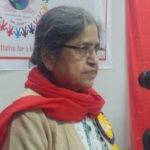Saleha Athar
CANADA: Progressive figures from South Asian Diaspora and Canada paid tributes to Karl Marx, the greatest thinker, social scientist and discussed the history and achievements of his ideology and challenges in today’s world.
The event was organized to celebrate the 200th birthday of Karl Marx as well as International Labour Day on May 6th at Brampton, Canada.
The hall was decorated with Karl Marx’s quotations, portrait and slogans with red flags.
Speakers shed light on the life, philosophy, political economy and struggle of Marx as well as the history of the labour movement, exploitation of women and children.
They also emphasized the need for building socialist movements in South Asia and unity of the Left to counter rising religious extremism and rightwing nationalism in the region.
Revolutionary songs, film and international were also presented.
Jacques R. Pauwels, an eminent Canadian historian, writer and author of several books, including “Big Business and Rise of Hitler” and “The Great Class War” spoke about Marxism in historical perspective, the rise of fascist rulers like Hitler and Mussolini, workers movement in the early 20th century.
During the great depression of the 1930s, Germany was an attractive place for multinational corporations in a world, he said. Capitalist powers made a huge profit from reconstruction and re-arming of Germany and then supplying arms to both sides of the Second World War.
Recent historical research in Germany has laid bare the links between Hitler’s regime and big German firms, the role of American firms such as General Motors, IBM, Standard Oil, Ford, and many others whose German subsidiaries sold equipment, weapons, and fuel needed for the German war machine.
Pauwels said corporations thrived on war, conflicts and supported Hitler’s fascist government.
Pauwels said a large-scale war provided an opportunity to the European powers to grab new colonial territories, important to growing capitalist economies. For the wealthy and ruling classes, war served as an antidote to social movements. But Europe’s elite did not expect a socialist revolution in Russia, and a wave of political and social reforms in Western Europe.
Pauwels said Hitler was a face of capitalism and did not want trade union in Germany. The fascist was always against socialism and the Soviet Union.
He also introduced the other books he wrote on political changes in the world.
He Pauwels also spoke about the ideology and intellectual contribution of Marx.
Azizul Malik highlighted the role of Bangladesh Communist Party in the history of Bangladesh’s democratic struggle and in its economic development.
AWP Federal Committee member Saleha Athar presented a paper on “Women and Marx” highlighting the rising incidents of violence against women and children.
A vast majority of people believe that it is socialism which can eliminate exploitation of working class, slavery and ensure setting up of an egalitarian society based on social justice, equal rights to all nationalities, cultural entities, and indigenous languages.
She said that only socialism can guarantee employment, free education and health and shelter and dignity to all working class people.
If a country wants to progress and increase production, it should ensure maximum utilization of its workforce — woman and man — as per their ability and skills.
“Marx had declared that labour power is the most precious commodity among all in the capitalist mode of production,” Saleha said.
Marx had truly predicted exploitation of women and children in capitalism and stressed on equal pay for equal work and focused on the class struggle but he was well aware of other social discrepancies especially gender inequality in the society.
Govinda Shiwakoti shared about the importance and relevance of Marxism in the context of Nepal and said that Himalayan state has been struggling to set up a socialist society through the democratic process.
Professor Sukhpal and Harpal Gadri also talked about Marx’s life Das Kapital, its relevance and importance.




